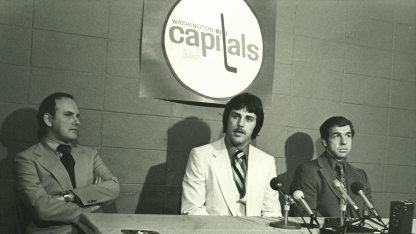Some questioned why general manager Max McNab would pass up two scoring phenoms from the Saskatoon Blades - Blair Chapman and Bernie Federko - for a defenseman, but McNab was eager to improve on the 840 goals the team allowed in the two previous seasons.
Green, an established defenseman in the Ontario Hockey Association, saw immediate action with the Capitals. The 20-year-old Green took the ice for the Capitals' first game of his rookie season, Oct. 5, 1976. He was sidelined for the second half of the season with a broken wrist, but still managed to record his first NHL goal Nov. 21 in a 3-1 win over the Colorado Rockies.
Only his second year with the club, Green was seen as the top defenseman on the team and shouldered much of the defensive load - averaging 35-40 minutes a night at the beginning of his career.
Fans were skeptical of Green's abilities since the team gave up 277 more goals than it scored during his first three years with the squad. He was booed on the ice, on the bench and even when his image appeared on the telescreen.
But by his fourth year in the league, the 23-year-old started to earn respect. Green was still playing 40 minutes a night along with fellow defenseman Robert Picard and the two linemates helped the team inch towards becoming a contender. During the 1979-80 season, the Capitals gave up only 32 more goals than they scored and finished with 27 wins - the most in the team's six year history.
After that season, Green was awarded the team's top defenseman honors and the fans had changed their tune about Green, handing him the Washington Unsung Hero award. But just one year later, the new fan favorite would be traded away in a deal that remains his legacy with the Capitals and was the biggest trade in team history. Green and forward Ryan Walter were traded to Montreal for defensemen Rod Langway and Brian Engblom and forwards Doug Jarvis and Craig Laughlin Sept. 10, 1982 - a move which saved the Capitals from having to relocate to another city.
The trade was a pivotal part of the "Save the Caps" campaign, captained by new general manager David Poile.
Poile remembers the impact of the deal he constructed only 10 days into his tenure with the team in order to give it an extra push to make the playoffs: "It was a huge risk when you look back, seeing that we traded two first-round picks who the previous administration thought were going to lead the Capitals through the competitive era. I am sure people were saying, 'Oh God, this may not work out.'"
But it did work out for the Capitals. Washington was immediately a contender as the club made the playoffs the following season - and for 13 consecutive seasons after that.

